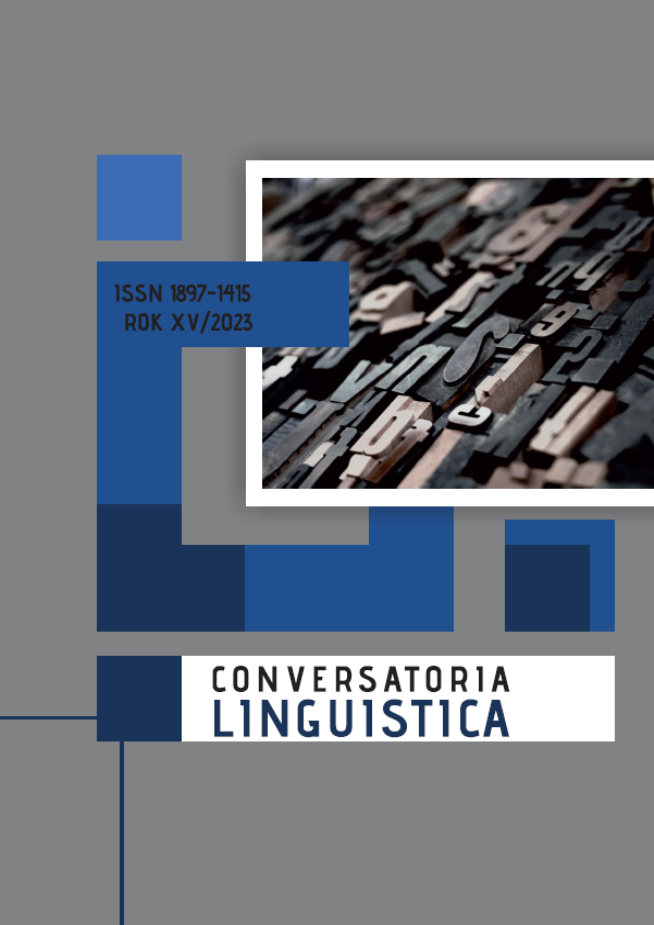Internetowe słowniki jednojęzyczne do nauki angielskiego
DOI:
https://doi.org/10.34739/clg.2023.15.08Słowa kluczowe:
słownik jędnojęzyczny, słownik internetowy, internetowy słownik jednojęzyczny, nauka języka angielskiegoAbstrakt
Due to the development of technology, well-established publishers began to provide their English Monolingual Learner's Dictionaries (MLDs) online and free of charge. Dictionaries of this type have their own history, as well as common and distinctive features. The article presents a brief outline of the subsequent stages of the development of English Monolingual Dictionaries, with special reference to MLDs available online. Also, the article includes a synthetic description of the primary and secondary components of a dictionary entry and demonstrates if these components are present or absent in three online Monolingual Learner's Dictionaries: the Cambridge Dictionary, the Longman Dictionary of Contemporary English, and the Oxford Learner’s Dictionary. The article aims to characterise, compare and contrast some of the features of a typical entry in online English MLDs. Consequently, the scientific approach adopted in the analysis is a mixture of the comparative and the empirical method. Unlike previous topic-related research, the present study shows both common and distinctive features of the mentioned dictionaries and hints at their practical advantages (from the point of view of the end user).
Pobrania
Bibliografia
Atkins B.T.S., Rundell M. (2008): The Oxford Guide to Practical Lexicography, Oxford.
Brinton L.J., Brinton D. (2010): The Linguistic Structure of Modern English, Amsterdam–Philadelphia.
Calzolari N., Picchi E., Zampolli A. (1987): The Use of Computers In Lexicography and Lexicology, in: The Dictionary and the Language Learner: Papers From the EURALEX Seminar at the University of Leeds, 1–3 April 1985, ed. A.P. Cowie, Tübingen, p. 55–77.
Chen Y. (2017): Dictionary Use for Collocation Production and Retention: a CALL-based Study, “International Journal of Lexicography” 30(2), p. 225–251.
Frankenberg-Garcia A. (2020): Combining user needs, lexicographic data and digital writing environments, “Language Teaching” 53(1), p. 29–43.
Herbst T., Stein G. (1987): Dictionary-Using Skills: A Plea for a New Orientation in Language Teaching, in: The Dictionary and the Language Learner: Papers From the
EURALEX Seminar at the University of Leeds, 1–3 April 1985, ed. A.P. Cowie, Tübingen, p. 115–127.
Heuberger R. (2020): Monolingual Online Dictionaries for Learners of English and the Opportunities of the Electronic Medium: A Critical Survey, “International Journal of Lexicography” 33(4), p. 404–416.
Hudson R. (1988): The linguistic foundations for lexical research and dictionary design, “International Journal of Lexicography” 1(4), p. 287–312.
Jackson H. (2002): Lexicography: An Introduction, London–New York.
Jadacka H. (2008): Kultura języka polskiego. Fleksja, słowotwórstwo, składnia, Warszawa.
Jucker A.H. (2016): History of English and English Historical Linguistics, Stuttgart.
Knight C. (1877): William Caxton, the First English Printer: A Biography, London.
Lew R. (2011): Online Dictionaries of English, in: E-Lexicography: The Internet, Digital Initiatives and Lexicography, eds. P.A. Fuertes-Olivera, H. Bergenholtz, London–New York, p. 230– 250.
Lew R. (2013): Online Dictionary Skills, in: Electronic Lexicography in the 21st Century: Thinking Outside the Paper. Proceedings of the eLex 2013 Conference, 17-19 October 2013, Tallinn, Estonia, eds. I. Kosem, J. Kallas, P. Gantar, S. Krek, M. Langemets,
M. Tuulik, Ljubljana–Tallinn, p. 16–31.
Lew R. (2015): Dictionaries and Their Users, in: International Handbook of Modern Lexis and Lexicography, eds. P. Hanks, G.-M. de Schryver, Berlin–Heidelberg, p. 1–9.
Müller-Spitzer C. (2014): Using Online Dictionaries, Berlin.
Nesi H. (2009): Dictionaries In Electronic Form, in: The Oxford History of English Lexicography, Volume 2: Specialized Dictionaries, ed. A.P. Cowie, Oxford, p. 458–478.
Osselton N.E. (2009): The Early Development of the English Monolingual Dictionary (Seventeenth and Early Eighteenth Centuries), in: The Oxford History of English Lexicography, Volume 1: General-Purpose Dictionaries, ed. A.P. Cowie, Oxford, p. 131–
–154.
Pastor V., Alcina A. (2010): Search Techniques in Electronic Dictionaries: A Classifi-cation for Translators, “International Journal of Lexicography” 23(3), p. 307–354.
Ranalli J. (2013): Online Strategy Instruction for Integrating Dictionary Skills and Language Awareness, “Language Learning & Technology” 17(2), p. 75–99.
Rizo-Rodriguez A. (2004): Current lexicographical tools in EFL: monolingual resources for the advanced learner, “Language Teaching” 37(1), p. 29–46.
Rundell M. (2008) [1998]: Recent Trends in English Pedagogical Lexicography, “International Journal of Lexicography” 11(4), p. 315–342. Reproduced in: Practical Lexicography: A Reader, ed. T. Fontenelle, Oxford, p. 221–243.
Smith P. (2016): Greek and Latin Roots: for Science and the Social Sciences, Part I – Latin. Victoria.
Vrbinc M., Vrbinc A. (2015): Diasystematic Information in Learner’s Dictionaries: The Usability of Multiple Labels, “GEMA Online® Journal of Language Studies” 15(1),
p. 111–128.




